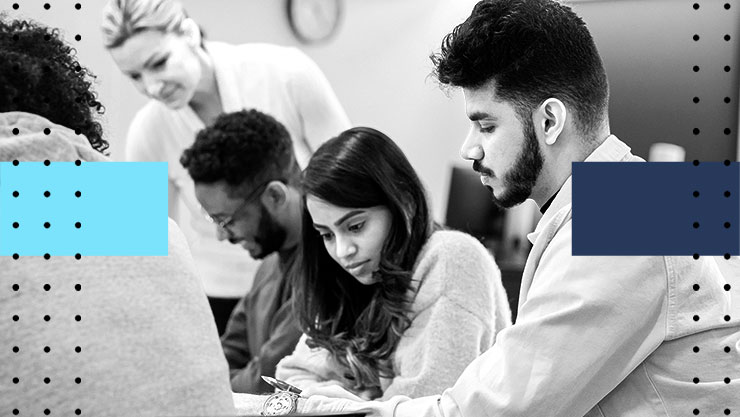
Empowering Education and Inspiring Learning with AI
Kate Maxwell, General Manager Worldwide Education Industry at Microsoft
The Era of Artificial Intelligence (AI) is upon us, and the speed of Generative AI adoption has been incredible. AI is transforming many aspects of our everyday work and life, with old norms being challenged and new opportunities being explored. AI is an incredible enabler for the workforce, for education, and for society at large. It allows us to connect, create, collaborate, learn, and innovate at an accelerated pace. As AI becomes increasingly ubiquitous, many existing jobs will require new skills, as well as a greater degree of “digital fluency.” For the global Education community, AI offers incredible potential to empower educators and improve student outcomes through personalized and democratized learning.
AI enables student achievement and educator efficiencies
Today, educators around the world are using digital resources to enrich learning programs across all levels of education. As an example, the game-based learning platform Minecraft Education offers fun and fascinating modules for contextualizing learning across subjects from chemistry to computer science, while stirring passion for STEM education in our youth.
As a parent of two young learners, I see this every day at my children’s schools – teachers leveraging technology in new and innovative ways to bring lessons to life, create unique learning experiences, and instill in students a genuine love of learning. This level of dedication, coupled with remarkable talent and a knack for inspiration, proves that teachers are and always will be an invaluable part of education. But the reality is that many educators are currently stretched thin and are being asked to do more with less – resulting in teachers spending personal time and resources to drive student outcomes. This moment of AI transformation is poised to change that. I am excited to see how AI can help educators and faculty save time, increase efficiencies, and harness the power of data to drive outcomes while also giving teachers time back in their day. A few such examples were highlighted recently during our Reimagine Education event… and this is only the beginning.
Equipping educators with modern technology skills empowers them to amplify impact, transcend traditional boundaries, and provide students with skills needed to thrive in a fast-paced tech-enabled landscape. The power of AI in Microsoft Reading Coach is a powerful example of AI in action. Educators report increased comprehension and higher scores, especially for struggling or reluctant readers, with AI-infused practice resulting in higher reading fluency for young people and greater teacher and parent satisfaction.
AI is changing workforce expectations and responsible AI skills needed for graduates
While AI has tremendous opportunity for improving learning, it’s also important for students to grow their Digital Fluency skills as they prepare for the workforce. This requires an understanding of responsible AI, so that students are knowledgeable about the risks, opportunities, and best practices associated with using AI. (Read more on the issues from Microsoft President Brad Smith sharing the societal importance and role of responsible AI in learning and everyday lives.)
Due to its incredible capacity for optimization, companies around the world are making AI an integral part of their day-to-day operations. A recent study from a leading publisher* equates the widespread adoption of AI with a “seismic shift” in the employment landscape, reshaping workloads and changing requirements for many occupations. According to the survey, 79% of employers believe workers and career entrants would benefit from training on using AI and other technologies in their current role.
This trend further emphasizes the importance of empowering educators across all stages of formal learning with AI training, comprehensive AI curricula, and built-in certifications that enable students to successfully transition from school to the workforce. In addition, employers also emphasize the importance of non-technical skills when asked about AI era talent** needs for new hires, including flexibility, critical thinking, adaptability, creativity, curiosity, and bias detection – all skills critical to working in an AI-infused world, and all areas in which education institutions can lean in to support student learning.
Meanwhile, as employers globally focus on filling in-demand technical job roles, Microsoft is partnering with academic institutions to connect data and AI skills and credentials to formal degrees to produce more highly qualified graduates ready to hit the ground running. Microsoft Learn offers a free collection of courses and learning paths for AI in education, allowing teachers to introduce AI concepts and skills building to academic curricula through exciting, hands-on experiences that keep learners engaged. Microsoft has also created a flavor of MS Learn, Microsoft Learn for Educators (MSLE), specifically devised to meet the needs of educators and academic institutions – integrating in-demand Microsoft skills programs and industry-recognized credentials to accredited education programs.
We embrace partnership with academic institutions and educators to jointly support graduates who are broadly educated and specifically skilled. In addition, the highly qualified graduates of MSLE-integrated programs are gaining employment opportunities through Microsoft Learn Career Connected (MLCC), connecting the Microsoft business partner community with technical talent and credentialed graduates.
I’m proud to share several examples of this fast-growing, education-industry alliance designed to support the future workforce and economies across the globe.
In India, Microsoft collaborated with the Ministry of Education and the All India Council for Technical Education (AICTE) to create skilling opportunities for millions of students and educators. The program offers learning paths, technical certifications, and hands-on experiences in AI, cloud, data science, data analytics, and security. In the US, Dallas College offers a blended learning model in AI, big data, and cybersecurity based on Microsoft courses and the MSLE program in 2-year degree and certificate programs.
Similarly, at Purdue University Global in the US, students earn credits toward a degree through completion of Microsoft skills courses in subject areas like AI, cybersecurity, and data science. The program, developed in collaboration with Microsoft, is designed to prepare students for in-demand job roles. In 2023, Microsoft supported development of Purdue’s Data 4 Good Case Competition for university students in the United States. Students from 71 universities were challenged to develop a plan to do image captioning using natural language processing.
And in the UK, at Nottingham University students across business, finance and accounting disciplines are augmenting their education with Microsoft data and AI skills and credentials creating pathways to jobs with area employers.
It is inspiring to see the AI-fueled innovation happening in the global education community, and to see academic institutions partnering with the tech community to meet industry demands for future talent. And as a parent, it’s encouraging to see so many academic institutions leveraging Microsoft resources to enhance AI learning, give teachers time back in their day, and boost student opportunities. At Microsoft, we are heartened by these examples of agility and transformation across global academic systems, and we look forward to continued partnership in this age of AI enablement in education.
To learn more about Microsoft Education skills and credentialing programs, check out these resources:
- Microsoft Learn
- Microsoft Learn for Educators (MSLE)
- Microsoft Learn Career Connected (MLCC)
- MSLE AI Bootcamp for Educators
- Azure Dev Tools for Teaching
- Microsoft Global Training Partners
*Cengage Group’s AI Workforce Employability Report, 2023
**Work Trend Index: Microsoft, 2023
About the Center of Expertise
Microsoft’s Public Sector Center of Expertise brings together thought leadership and research relating to digital transformation in the public sector. The Center of Expertise highlights the efforts and success stories of public servants around the globe, while fostering a community of decision makers with a variety of resources from podcasts and webinars to white papers and new research. Join us as we discover and share the learnings and achievements of public sector communities.
Questions or suggestions?






